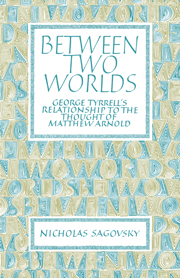Book contents
- Frontmatter
- Contents
- Acknowledgments
- Abbreviations and note on references
- 1 Tyrrell and Arnold ‘between two worlds’
- 2 The history of an opinion
- 3 ‘Definite evidence’
- 4 Fundamental convergence: epistemology and metaphysics
- 5 The life of the spirit: ecclesiology and culture
- 6 Christology: the parting of the ways
- 7 God, and ‘the Power that makes for Righteousness’
- 8 Conclusions
- Appendix Two letters to the Abbé Venard
- Notes
- Select bibliography
- Index
3 - ‘Definite evidence’
Published online by Cambridge University Press: 23 October 2009
- Frontmatter
- Contents
- Acknowledgments
- Abbreviations and note on references
- 1 Tyrrell and Arnold ‘between two worlds’
- 2 The history of an opinion
- 3 ‘Definite evidence’
- 4 Fundamental convergence: epistemology and metaphysics
- 5 The life of the spirit: ecclesiology and culture
- 6 Christology: the parting of the ways
- 7 God, and ‘the Power that makes for Righteousness’
- 8 Conclusions
- Appendix Two letters to the Abbé Venard
- Notes
- Select bibliography
- Index
Summary
Vidler, as we have seen, assembled certain pointers to show that Tyrrell was influenced by Arnold, but he also wrote, ‘In the absence of more definite evidence we may hesitate to put forward any certain conclusion as to the extent to which he was directly influenced by Arnold and the other “grands libéraux anglais”.’ Actually, there is a good deal more definite evidence than Vidler saw and in this chapter we shall examine those places where Tyrrell refers to or draws upon Matthew Arnold. However, before doing that it is important to enter certain caveats.
In the first place, as a cultured man who moved in an atmosphere of literary and theological discourse, Tyrrell picked up all kinds of ideas and phrases from books that he never actually read. Furthermore, Arnold deliberately coined phrases like ‘Power that makes for righteousness’, ‘Philistines’, ‘Sweetness and Light’ and so on, intending that they should become part of the common linguistic currency. Tyrrell was in many ways a theological journalist and his use of such phrases by no means implies attentive reading of Arnold. On the evidence to be set out here, we can confidently say that Tyrrell, an avid reader increasingly interested in liberal expression, did read Arnold, but we should recognise that, like many of us, he always tended to be influenced by the last book he read, and a sudden spate of references to Arnold, or phrases from Arnold, does not necessarily signify permanent or even lasting indebtedness.
- Type
- Chapter
- Information
- Between Two WorldsGeorge Tyrrell's Relationship to the Thought of Matthew Arnold, pp. 20 - 37Publisher: Cambridge University PressPrint publication year: 1983

